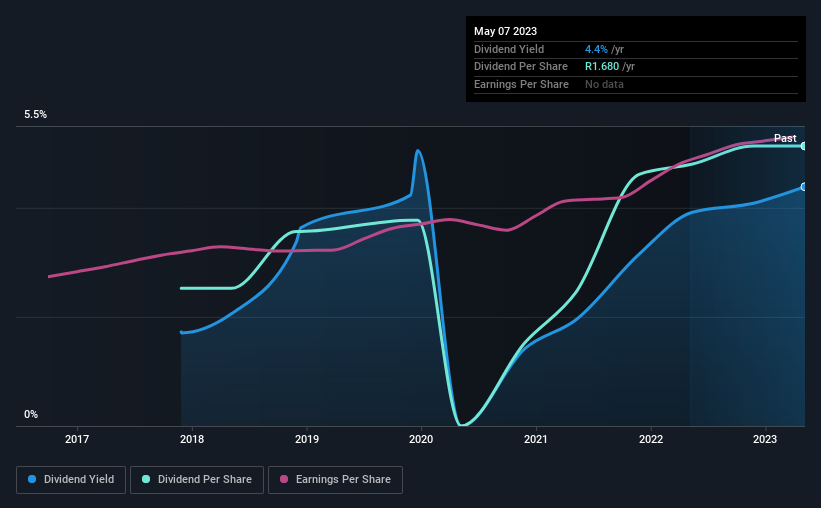- South Africa
- /
- Food and Staples Retail
- /
- JSE:KAL
KAL Group (JSE:KAL) Will Pay A Larger Dividend Than Last Year At ZAR0.50
The board of KAL Group Limited (JSE:KAL) has announced that it will be increasing its dividend by 8.7% on the 12th of June to ZAR0.50, up from last year's comparable payment of ZAR0.46. This will take the annual payment to 4.4% of the stock price, which is above what most companies in the industry pay.
View our latest analysis for KAL Group
KAL Group's Dividend Is Well Covered By Earnings
A big dividend yield for a few years doesn't mean much if it can't be sustained. Before making this announcement, KAL Group was paying a whopping 170% as a dividend, but this only made up 30% of its overall earnings. The business might be trying to strike a balance between returning cash to shareholders and reinvesting back into the business, but this high of a payout ratio could definitely force the dividend to be cut if the company runs into a bit of a tough spot.
Over the next year, EPS could expand by 10.0% if recent trends continue. If the dividend continues along recent trends, we estimate the payout ratio will be 30%, which is in the range that makes us comfortable with the sustainability of the dividend.

KAL Group's Dividend Has Lacked Consistency
KAL Group has been paying dividends for a while, but the track record isn't stellar. This makes us cautious about the consistency of the dividend over a full economic cycle. The annual payment during the last 5 years was ZAR0.826 in 2018, and the most recent fiscal year payment was ZAR1.68. This works out to be a compound annual growth rate (CAGR) of approximately 15% a year over that time. Despite the rapid growth in the dividend over the past number of years, we have seen the payments go down the past as well, so that makes us cautious.
The Dividend Looks Likely To Grow
With a relatively unstable dividend, it's even more important to see if earnings per share is growing. KAL Group has impressed us by growing EPS at 10% per year over the past five years. With a decent amount of growth and a low payout ratio, we think this bodes well for KAL Group's prospects of growing its dividend payments in the future.
In Summary
In summary, while it's always good to see the dividend being raised, we don't think KAL Group's payments are rock solid. With cash flows lacking, it is difficult to see how the company can sustain a dividend payment. We don't think KAL Group is a great stock to add to your portfolio if income is your focus.
Investors generally tend to favour companies with a consistent, stable dividend policy as opposed to those operating an irregular one. Still, investors need to consider a host of other factors, apart from dividend payments, when analysing a company. To that end, KAL Group has 3 warning signs (and 1 which is a bit concerning) we think you should know about. Looking for more high-yielding dividend ideas? Try our collection of strong dividend payers.
Valuation is complex, but we're here to simplify it.
Discover if KAL Group might be undervalued or overvalued with our detailed analysis, featuring fair value estimates, potential risks, dividends, insider trades, and its financial condition.
Access Free AnalysisHave feedback on this article? Concerned about the content? Get in touch with us directly. Alternatively, email editorial-team (at) simplywallst.com.
This article by Simply Wall St is general in nature. We provide commentary based on historical data and analyst forecasts only using an unbiased methodology and our articles are not intended to be financial advice. It does not constitute a recommendation to buy or sell any stock, and does not take account of your objectives, or your financial situation. We aim to bring you long-term focused analysis driven by fundamental data. Note that our analysis may not factor in the latest price-sensitive company announcements or qualitative material. Simply Wall St has no position in any stocks mentioned.
About JSE:KAL
KAL Group
Operates as a diversified trader and retailer in the agricultural, manufacturing, retail, and fuel and convenience markets in South Africa and Namibia.
Flawless balance sheet and good value.
Market Insights
Weekly Picks


Crazy Undervalued 42 Baggers Silver Play (Active & Running Mine)


Fiducian: Compliance Clouds or Value Opportunity?

Willamette Valley Vineyards (WVVI): Not-So-Great Value
Recently Updated Narratives

Silver's Breakout to over $50US will make Magma’s future shine with drill sampling returning 115g/t Silver and 2.3 g/t Gold at its Peru Mine

SEGRO's Revenue to Rise 14.7% Amidst Optimistic Growth Plans

After the AI Party: A Sobering Look at Microsoft's Future
Popular Narratives


MicroVision will explode future revenue by 380.37% with a vision towards success


NVDA: Expanding AI Demand Will Drive Major Data Center Investments Through 2026




